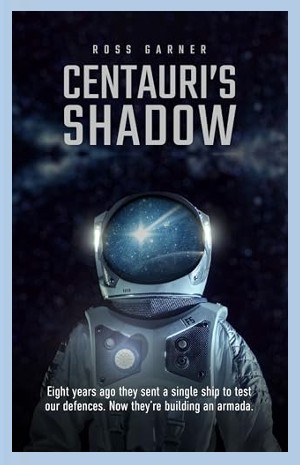CENTAURI’S SHADOW by Ross Garner-Review and Guest Post

Amazon.com / Amazon.ca / Amazon.uk / Amazon.au /
Don’t own a Kindle? Download the FREE Amazon Kindle App for your mobile device or pc
ABOUT THE BOOK: Release Date April 8, 2024
‘Eight years ago they sent a single ship to test our defences. Now they’re building an armada.’
Cole grew up in the shadow of grief. Kyoko grew up in the shadow of war. Two pilots, separated by time, set out on parallel journeys to Proxima Centauri. What they find could be the start of something new. What they bring with them could be the end of all we know.
In this sweeping science fiction debut from Ross Garner, readers will find an Earth that is transformed by fear of an imminent invasion; a space station in orbit that acts as a gateway to other worlds; a Martian colony with all of the threat and violence of the Old West; and a distant star where answers can be found.
What is ‘the signal’? A greeting, or a threat?
••••
REVIEW: CENTAURI’S SHADOW by Ross Garner is an adult, science fiction thriller focusing on a potential war on the horizon with an alien race.
Told from dual omniscient third person perspectives (Cole and Kyoko), focusing on two timelines, CENTAURI’S SHADOW follows in the wake of a message from space possibly signifying a senscient lifeform from beyond the sun but the UNSA’s (United Nations Space Agency) first attempt to circumnavigate the sun, ends in disaster, and years later, the sole remaining survivor, volunteers to set a plan into motion, to reach the Centauri system, in an effort to complete the original mission.
Meanwhile, several decades into the future, Earth and its’ colony on Mars have been attacked by an unknown enemy, and Kyoko and her crew of fighter pilots is tasked with ending all future attacks but Kyoko will quickly discover that all is not well on her voyage towards the end.
The characters are numerous, determined, dynamic and often lost. Mars is not so much a respite from Earth, but a virtual imprisonment for those who have been forgotten or have no direction home.
CENTAURI’S SHADOW is a detailed, complex and intriguing story of what ifs and whys. Humans have not learned from the past, and the past is gearing to repeat itself over and over again. Every generation or two fights for power and control, and in this, vengeance and greed lead to another war that no one will win.
Copy supplied for review
Reviewed by Sandy

Click HERE to read the first chapter of CENTAURI’S SHADOW by Ross Garner

The Wright Flyer to Apollo 11
By Ross Garner
In 1903, Orville and Wilbur Wright made history as the inventors and pilots of the Wright Flyer: the first airplane. Of the first four test flights, the most successful was the last: covering a distance of 260 metres.
Just 66 years later, astronauts Neil Armstrong, Buzz Aldrin and Michael Collins flew Apollo 11 a distance of 953,054 miles. They landed on the moon, and returned safely.
There aren’t many people who lived through both events. A person born in the United States in the 1880s had a life expectancy of just 40 years. But there were some: a miraculous few who experienced first hand the transition from the Old West to the Space Age.
What was their reaction to this dramatic change in our technological capability? Did they feel like time travellers, leaving the world of the horse and wagon behind in favour of rockets and satellites?
It was this idea that led to the writing of Centauri’s Shadow, my first novel.
I imagined an astronaut, setting out alone to visit our closest star: Proxima Centauri. The journey would take him 40 trillion kilometres away from Earth. With today’s technology, it would take 70,000 years.
He would need to be frozen somehow, waiting to be reawakened on arrival.
And how might his home planet have changed while he slept?
If humankind’s technology could shift from a flimsy biplane to a rocket-fuelled spaceship in just 66 years, how might it evolve over 70,000 years?
It seemed reasonable to conclude that our technology would continue to improve. That the journey time would shrink from 70,000 years, to something more manageable.
By the time our astronaut arrived, Proxima Centauri could be home to millions of people: living in spaceships, space stations, and on other worlds.
I thought about this astronaut: sacrificing his life on Earth to be the first great explorer to visit another star, only to find that the journey had been pointless. The time, wasted. The sacrifice, meaningless.
And I decided to turn this idea into a book.
The story of Centauri’s Shadow evolved in the writing. The astronaut in question became Cole Anderson, and he journeys to Proxima Centauri not with a traditional rocket but with the use of solar sails: a method of propulsion that already exists and uses the pressure from solar radiation to gain speed.
With a bit of science fiction fudgery, the journey time was reduced to 30 years: allowing for a stronger emotional tie to Cole’s life and relationships back home. But the core concept remained, including the themes of time and sacrifice.
And the original idea lingers in the novel in another major way: the notion of the Old West, complete with saloons, brothels, missionaries and violence, re-emerged in the form of the first martian colony.
It took me 10 years in total to finish the story. A rather damning reflection of my ability to get things done when compared to the accomplishments of those who followed in the steps of the Wright brothers.
But I came to have sympathy for Cole, with all his faults. He did his best to find his way, as we all do.
Readers can make up their own minds whether it was worth it.
Centauri’s Shadow is available now on Amazon (US / UK / Canada)

